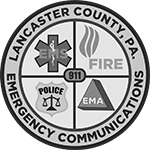10 Ways You Can Help Us Help You
- When possible familiarize yourself with your surroundings. Know the address, city or borough, the township of places common to you. For example where you work and your loved ones home addresses. Make it a point to have this information available where you can find it easily and quickly.
- Help visitors or housesitters familiarize themselves when in your home. Keep your address, twp, city or borough and phone number in plain sight for visitors especially for your babysitter or anyone who may be in your home.
If you have a choice between a landline phone and a cell phone, and it is safe to do so, especially if you are calling from someone else's residence, use the landline. The information will come up on our screen, and we still need to verify it; if you are unsure of the address, a landline will help provide information. Cell phones will give us an area of where you are located but not always the exact location - it might be two or three houses away or the exact location. - Let dispatchers take lead on the questions. This saves time. Plus, we do not have to repeat questions you might have already answered.
- Be aware as we are gathering information from you, we are dispatching units right away. The fact that we still have you on the phone does not mean something is not being done. As we are asking questions, we are adding them to the call, and it is being given out to the responding units.
- We have certain questions that we have to ask, along with other questions that help first responders when responding to a call - descriptions of vehicles subjects and direction of travel. If you can give us north, south, east or west, or towards a road or town; up or down the road is a common, but not an accurate, direction of travel be patient with us and try to answer every question to the best of your knowledge. You may not understand why we ask certain questions, but there is a reason for each and every one. It is not uncommon to have more than one accident occur in the same area at the same time, so asking for vehicle descriptions helps us determine the accident location.
- For ambulance calls, we will be asking questions to determine what kinds of responses are needed, and there is also a certain order in which we ask the questions. Sometimes it seems like we are asking the same question, but we are asking it in a different way. For instance, we may ask if they are breathing, we may ask if they are having any difficulty breathing.
- We also give medical advice to help the patient before the ambulance arrives. Examples are: we can give CPR instructions and directions for delivering a baby
- **especially for children** do not hang up the phone until we tell you to do so. For certain calls, we will keep you on the line until someone is with you, so we can update units that are en route to the emergency.
- Teach children that we cannot see them if they are answering our questions by nodding.
- Do not hang up on a call to 911 that you misdialed. Please stay on the line to tell us that. We have to check out every hang-up call. If you have a habit of making misdialed calls on your cell phone or it makes a phone call that you are unaware of, please keep your keypad locked. If a hang-up call is something we feel needs checked out, we will send the police.


